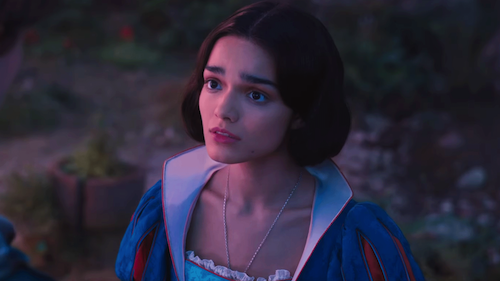Snow White
Written by Andreas Babiolakis
We have finally reached one of the most discussed films in recent memory (and often for unfortunate reasons): Snow White. Disney’s latest live action remake of a beloved property takes us all the way back to their very first feature film (once — and still is — marveled as a masterpiece of animation and innovation). Now, the tale of the princess Snow White, the Evil Queen, and those lovable seven dwarfs has been reconstructed for a new age, just under ninety years since Disney broke ground with this film’s source material. The lead up to this release has been a rough one. Right from the jump back in 2021, star Rachel Zegler (from the recent West Side Story) was instantly detested by many die-hard Disney fans (and, let’s be honest, a whole slew of chronically online incels and right winged snowflakes — term intended) because of her remarks regarding this project; from negatively talking about the original Snow White and the Seven Dwarfs (a film millions of people hold dearly to their hearts, clearly) to her other instances of sociopolitical outspokenness, Zegler had outcries for Disney to recast the part of Snow White for quite some time (I will not get into the proclamations of diversity hiring during this review, so if that is what you are expecting, do not waste your time). This was far from the only mark that the 2025 Snow White had on its production. The debate between how the dwarfs should be cast or presented was another major talking point, from actor Peter Dinklage dismissing the film’s existence altogether (for its “backwards” depiction of those with dwarfism) to the eventual reveal of the CGI characters already looking twelve years dated. Toss in those boycotting all things Gal Gadot while the Palestinian genocide rages on (due to the star’s support for Israel, having fought for the Israel Defense Force earlier in her life), and you’ve got a tumultuous production and promotional period.
After all that, Snow White winds up being quite a lovingly made film full of joy and optimism from all angles, which may help you forget about the snowball effect of all of the controversies that led up to this point. Having said that, Snow White isn’t a particularly strong film in any respect outside of being cheerful, which may be what you seek. Directed by Marc Webb (of 500 Days of Summer fame), Snow White is a glowing, colourful musical that also aims to discuss the evils of the world today via the character of the Evil Queen (Gadot); the rewriting of her character in this way works decently as a metaphor but not with anything new to say during these times where just one glance at our phones may feel like another punch to the gut because of what news has dropped this time (“love will conquer the day” can only get us so far in 2025, especially for the kids who have a grim future ahead of them if things don’t shape up).
Trying to keep our heads up isn’t why Snow White is bland, though. For me, I’d have to point towards Webb for this. I’ve noticed that enough of his films suffer from questionable pacing; I can never forget how unbelievably brisk and awkward the handling of Uncle Ben’s passing in The Amazing Spider-Man was, as if he said “we all know what happens, so why don’t we just get it over with?” and called it a day. Outside of 500 Days of Summer, I have found all of his films to be like fluttering butterflies that never land long enough to be grounded (although they can be nice to look at, we get nothing out of these experiences). Such is the case with Snow White: a film that was built to be a three-hour epic due to its surprisingly robust ideas and themes, which winds up being an hour and fifty minutes of rushed ideas and revelations. Toss in all of the expected notes to be hit (from characterizations of the original animated film, to the emotional cues of family films that wouldn’t dare veer off course), and you’ve got a feature film that kind of just exists. Everything on screen feels like ample enough proof that everyone wanted to be there throughout this whole troublesome process, but no amount of passion can turn this limp film into something profound; love can only make it watchable in the interim before it is instantly forgotten.
Snow White isn’t all that bad thanks to the passion put into the film, but it is far from remarkable.
We kick off with a young Snow White — born in a snowstorm (hence the name) — losing her mother (the queen) to a mysterious illness. Her father (the king) remarries an unknowingly corrupt fiend, who then becomes the Evil Queen (Gadot); he vanishes without a trace, and out of jealousy, the Evil Queen imprisons Snow White. Snow White grows up (Zegler) and stumbles upon a group of rebellions led by a new character, Jonathan (Andrew Burnap); Jonathan is meant to replace the Prince character from the animated film, perhaps to create a stronger connection between him and Snow White in this version. Once Snow White’s kindness — releasing the rebels — grants her the title of the fairest one of all from the Magic Mirror, the Evil Queen sends the Huntsman (Ansu Kabia) to kill her. He cannot do so, and he allows Snow White to quietly flee into the woods. She finds safety in a random house there, surrounded by cute animals, and falls asleep within it. Of course, this is the house of the seven dwarfs, who are seen mining (they are even granted the ability to sing that iconic song “Heigh-Ho” from the 1937 film, which is a little bit weird considering that they are at work while chanting “It’s off to work we go”). They come home and find — gasp — the Snow White in their bed! And just like that, she is okay to stay in hiding. Most of the dwarfs (save for that prickly Grumpy) invite her right away. She starts to change their lives instantly, from teaching Dopey how to whistle to getting the dwarfs to not bicker and fight as much. Does Snow White possess this much magic, or does Webb struggle with pacing?
The film only proceeds to want to do more while getting by with as little as possible. The rebel storyline is brought back but only half baked. The Evil Queen resorts to that whole poison-apple-old-lady routine rather hastily. The dwarfs kind of come and go as the film sees fit, while Snow White’s romance with Jonathan is as speedy as the kind of relationship Zegler and company clearly didn’t want to have with this film. I’m all for fairy tale and fantasy films acting like condensed fables; see the 1937 Snow White and the Seven Dwarfs for a film that really takes no time at all to get going and conclude. However, when Webb’s Snow White seeks narrative complexity by introducing so many new threads and hints of multifaceted richness while zipping through everything, we don’t get the simplicity of the original or the nuance that was anticipated. Instead, Snow White — like so many of these live action remakes — makes us feel like we are on the ride of the film, rather than us watching the film itself. We see glimpses of what we recognize, feel a bit of the whimsy we expect, and leave itching to revisit the property that made us go on this ride in the first place. Was that Disney’s goal all along with these remakes? To have us watch these new versions, only to desire the classics, thus bringing two views per person on the Disney+ streaming platform? I wouldn’t doubt it at this point. It wouldn’t make sense that it’s a rights-based concern when Disney is remaking films like Moana that aren’t old at all.
The new songs are decent and fitting, but they only remind us of how little there is in the film regarding substance; there are quite a handful of original tunes which, when removed, will expose how brutally fast the film moves when it isn’t pausing to sing to us. Gadot tries her best as the Evil Queen but — despite being at least a little different than how she normally is — she still feels like she is acting, and I never felt threatened by her presence. The main highlight, oddly enough, is Zegler who was destined to be a Disney princess; just like her West Side Story cohort Arianna DeBose was given a less-than-stellar Disney film, Wish, despite being a natural Disney princess through and through, Zegler can only elevate the pretty-but-dull Snow White so far with her magnetism and presence. All of this is to say that there are ongoing elements that keep the film going and watchable to enough of a degree, but Snow White’s flaws cannot be ignored because they are as frequent as its strengths; the film rides that middle line its entire time. Its visual effects are stunning when the story feels flat. The music will seem not too shabby when the plot isn’t going anywhere. The dwarf’s characteristics seem pretty interesting when they look like sleep paralysis demons. The pivotal moment with Dopey in the film’s climax is sweet, yet a nearly-identical rip off of the Boots scene in the live action Dora the Explorer film, which can be seen here. The film never descends into the territory of being awful, but it is forever being held back from being great as well.
What I find the most insane about this tug-of-war — between a dedicated cast and crew and an army of disdain from the general public — is that the film is neither the masterpiece that the 270 million dollar budget and lengthy production desired, or the disaster that the review-bombing and smear campaigns would have you believe. It is a single dose of mediocrity: a fancy-yet-drab live action remake that is indicative of what all of these live action remakes have been like for the most part. You can only pour on so much seasoning onto a microwaved TV dinner before you accept that this meal could only be so good. Snow White won’t be championed through the test of time, or heralded as the biggest bomb in Disney history. It will simply be forgotten like every other Disney live action film that has come and gone. My heart hurts for those who spent hours making this film when, in the end, it is just unremarkable; while this isn’t nearly as bad as the trolls insist, it may be worse because even terrible films may leave more of an impression than this feature of blood, sweat, tears, and uphill battles ever will.
Andreas Babiolakis has a Masters degree in Film and Photography Preservation and Collections Management from Toronto Metropolitan University, as well as a Bachelors degree in Cinema Studies from York University. His favourite times of year are the Criterion Collection flash sales and the annual Toronto International Film Festival.






